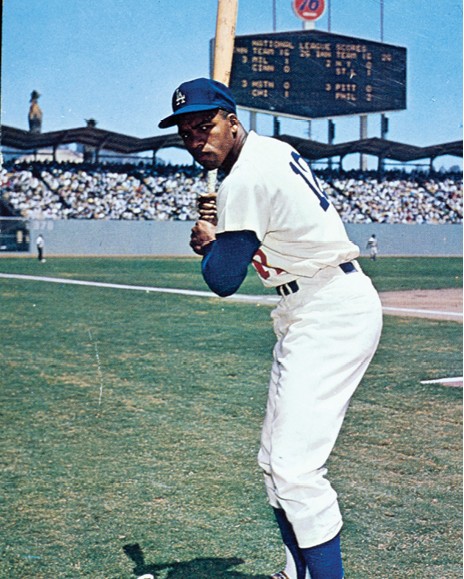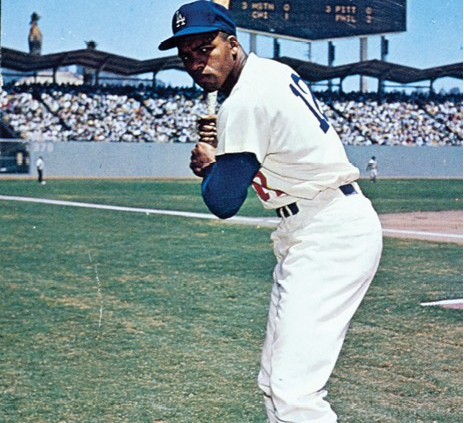September 29, 1963: Dodgers’ Tommy Davis secures second consecutive NL batting title

Tommy Davis. (SABR-Rucker Archive)
In late September 1963, the pennant races were winding down and it seemed likely that the Los Angeles Dodgers would meet the New York Yankees in the World Series. Only some individual honors were yet to be determined on the final day of the season – including whether Tommy Davis would claim his second consecutive National League batting title for the Dodgers.
The league batting race was the source of a good deal of drama as the season wrapped up in late September, with seven players involved. On Tuesday, September 17, Roberto Clemente of the Pittsburgh Pirates moved into a narrow lead over the St. Louis Cardinals’ Dick Groat with a mark of .3231 to .3227. Davis was third at .3219.1 Others in the chase were Orlando Cepeda of the San Francisco Giants, Vada Pinson of the Cincinnati Reds, Hank Aaron of the Milwaukee Braves, and Tony González of the Philadelphia Phillies.
On Friday, September 20, Davis went 3-for-4 in a 2-0 win over the Pirates to move ahead of Groat, .324 to .322.2 Clemente had dropped to .320. Davis led the rest of the way but it wasn’t easy. By September 22, Davis had dropped a point to .323 with Cepeda and Groat close on his heels at .320.
Yet with only a week remaining in the season and the pennant not yet clinched, the Dodgers had to focus on the standings, not the batting race. On September 24 the Dodgers clinched the pennant before taking the field as the second-place Cardinals lost a day game in Chicago to the Cubs, 6-3. In their night game in Los Angeles, the Dodgers handled the New York Mets, 4-1, but Davis was hitless in three at-bats.
The next day three Dodgers pitchers shut out the Mets, 1-0, as Davis went 2-for-3. Davis was not in the lineup on September 26 but returned on Friday against the Phillies to go 2-for-3. In his final regular-season game, on September 28, Davis hit a two-run home run in the first inning. After flying out in his next at-bat, Davis left the game and the club to travel with his wife to New York following the death of his mother-in-law.3 The Dodgers lost the game, 12-3.
Over his final eight games, Davis collected 11 hits in 28 at-bats, a .393 clip, to separate himself from Clemente, Groat, and Aaron in the batting race. Davis’s mark of .326 gave him the batting title ahead of Clemente at .320, and Groat and Aaron tied at .319. Davis’s average won not just the NL title. He also led the majors as Carl Yastrzemski topped the American League with a .321 average.4
On September 29 the Dodgers hosted the Philadelphia Phillies to close out the regular season. Los Angeles had clinched the National League flag five days earlier, and by some accounts used the finale as a World Series tuneup with a chance to rest some of its regulars. At that point, Davis seemed assured of winning the batting title and his early departure from the team for family reasons was not an issue.5
Despite the absence of their hitting star, the Dodgers still had reason to do more than just show up for the final game. The team was sitting on 99 wins for the season, and starter Don Drysdale was going for his 20th victory.
In the bottom of the first inning, a double by shortstop Maury Wills, a steal of third, and a sacrifice fly from center fielder Willie Davis gave Drysdale a quick 1-0 lead. Drysdale was solid for “five scoreless innings [and] probably could have rolled on to win his 20th,”6 but manager Walter Alston was taking no chances in the 102-degree heat and turned to Pete Richert and Bob Miller to close out the game.
The Phillies were quiet until shortstop Bobby Wine tied the game in the top of the seventh with a solo home run off Richert. Pitcher Chris Short helped his own bid for a victory by following Wine’s shot with a single to center. A walk to second baseman Tony Taylor sent Short to second. Right fielder Johnny Callison then gave Philadelphia a 2-1 lead when his double to left sent Short home.
Philadelphia added an insurance run in the ninth inning on a single by third baseman Don Hoak, two groundouts that moved Hoak along the basepaths, and a run-scoring single by Taylor.
The Dodgers were unable to score after the first inning; they were held in check by pitchers Art Mahaffey, Jack Baldschun, and Short, who earned the win. LA managed only six hits, all singles except for Wills’ double leading off the first inning for the Dodgers.
The loss was the Dodgers’ third straight to the Phillies to close out the regular campaign. Philadelphia finished in fourth place in the National League, 12 games back of the Dodgers. With the win, the Phillies finished 11-7 against the Dodgers for the season, including “seven out of nine at Dodger Stadium.”7 Despite their strong finish, the Phillies fell one game short of overtaking the San Francisco Giants for third place, while the St. Louis Cardinals claimed second place.
Clearly the Dodgers could have used Davis’s bat in the lineup for the season-ender. In addition to the batting championship, Davis finished the season with 181 hits, 16 homers, and 88 runs batted in, and was a major reason the team advanced to the World Series. At age 24, Davis was the youngest to ever win two straight NL batting titles. Davis had hit .346 for the Dodgers in 1962 while pounding out 230 hits.8 Jake Daubert in 1913-14 was the only other Dodger to win back-to-back league batting titles. The last player to accomplish the feat prior to Davis was Stan Musial, who won three straight hitting crowns from 1950 to 1952.9
Davis’s performance was even more impressive considering that he started the season with a pulled “hamstring muscle behind the knee of the right leg” incurred in a March 31 exhibition game. Improvement in the leg was so slow that Davis was admitted to the hospital April 18 “to assure complete rest” while being treated for the injury.10 After spending over a week in the hospital, Davis returned to action on April 29 as a pinch-hitter. He appeared in 146 of the Dodgers’ 162 games during the season.11
For Tommy Davis, 1962 and 1963 marked the peak of what looked to be a promising career. The batting titles, combined with power and speed, showed the potential star power of the young outfielder. What seemed like the beginning of a Hall of Fame career ended suddenly on the basepaths in 1965. On May 1, the Giants were in Dodger Stadium. Davis was running from first to second on a groundball but slid awkwardly and snapped his ankle.12 The injury ended his season and altered his career, which never got back on its promising track, although he did play 18 seasons for 10 teams and had a career .294 batting average.
Sources
In addition to the sources cited in the Notes, the author consulted Baseball-Reference.com and retrosheet.org.
https://www.baseball-reference.com/boxes/LAN/LAN196309290.shtml
https://www.Retrosheet.org/boxesetc/1963/B09290LAN1963.htm
Notes
1 “Clemente New Bat Leader for NL,” Napa Valley Register (Napa, California), September 18, 1963: 10.
2 “Baseball’s Top Ten,” San Francisco Examiner, September 21, 1963: 42.
3 “Southpaws to Start in First Series Game,” Stockton (California) Daily Evening Record, September 30, 1963: 29.
4 John Thorn, Phil Birnbaum, and Bill Deane, Total Baseball, 8th Edition (Toronto: SPORT Media Publishing, 2004).
5 John Hall, “Dodgers Lose ‘Tuneup’; T. Davis Tops Batters,” Los Angeles Times, September 30, 1963: 47.
6 Hall.
7 Hall. The Los Angeles Times erroneously reported that the Phillies won six out of nine at Dodger Stadium in 1963 but according to retrosheet.org the Phillies in fact won seven.
8 Davis also led the major leagues in hitting in 1962 as Pete Runnels of the Boston Red Sox led the American League that season with a .326 average. Thorn and Birnbaum.
9 “Tom Davis, Yastrzemski Capture Batting Crowns,” Allentown (Pennsylvania) Morning Call, September 30, 1963: 8.
10 “Tommy Davis Lost to L.A. for Week,” Oakland Tribune, April 20, 1963: 11.
11 Thorn and Birnbaum.
12 Paul Hirsch and Mark Stewart, “Tommy Davis,” SABR BioProject, https://sabr.org/bioproj/person/tommy-davis-2/.
Additional Stats
Philadelphia Phillies 3
Los Angeles Dodgers 1
Dodger Stadium
Los Angeles, CA
Box Score + PBP:
Corrections? Additions?
If you can help us improve this game story, contact us.


